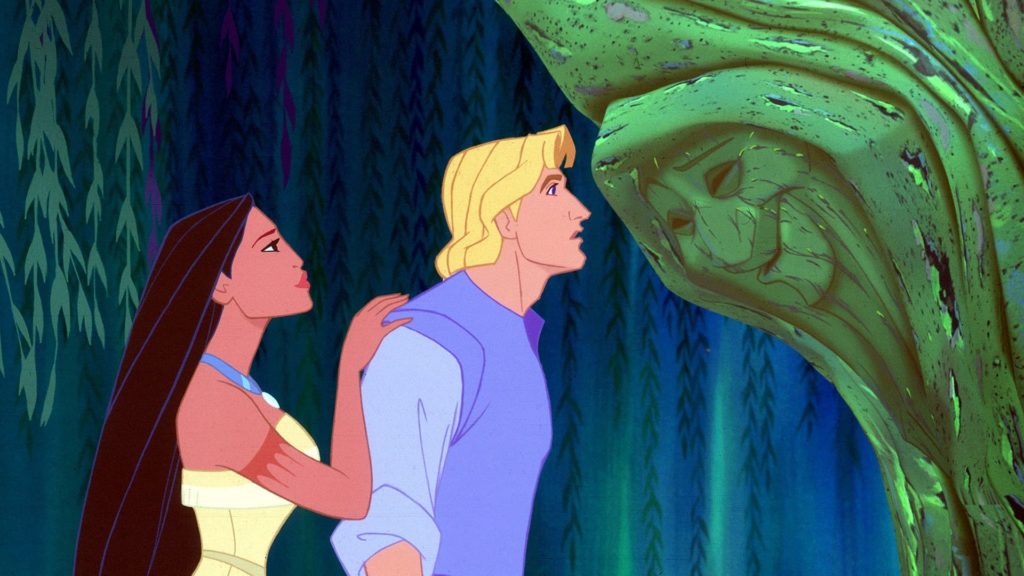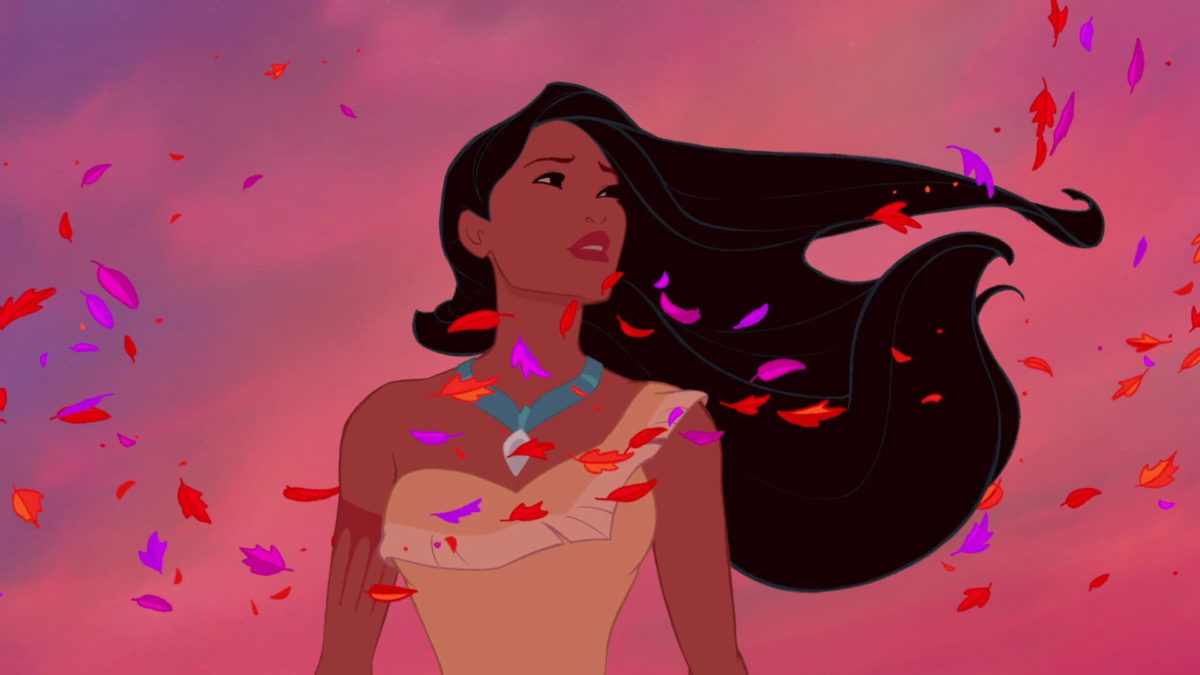It’s hard to think of a movie with more wasted potential: Disney at its peak Renaissance powers, following a string of more-or-less masterpieces, releasing a catastrophic misfire.
Part of the frustration is that some aspects of the movie just work. For starters, this ranks with The Lion King as the most striking CAPS film in Disney’s annals. The use of color is terrifically inventive: Natural earth tones accented by fantastical flashes of sunset colors: purples and oranges, with some beautiful teals for good measure.
The character designs are quite memorable as well. The humans are less cartoonish than any other Disney feature from the era, sharp and angled and thick-lined like anatomy sketches. Pocahontas, in particular, is a masterpiece: Her long, dark hair is fluid and expressive. There’s something both regal and delicately feminine in her posture, capturing the complexity of character that she hypothetically should have.
(However, the animators seem to have a hard time with the faces: The more realistic face shapes occasionally look unwieldy and stilted when in motion.)

Too bad about the script, then. The first half of the movie borders on tolerable before a hard pivot for the worse. It’s hard to overstate how self-important and preposterous this movie’s final act is; its “unity” theme (with whiffs of half-assed environmentalism) is not shoehorned in so much as it is pounded with a sledgehammer. Just read the lyrics of “Savages” for a microcosm of the film’s heavy-handedness. (“They’re different from us! / That means they can’t be trusted!”)
Curiously, “Just Around the Riverbend” suggests a theme that would have worked so much better for the movie: How does a person and a society face the headwinds of inevitable and unceasing change? But somewhere in the revisions, this thread lost its way.

Nearly as jarring as the aggressive soapboxing is the movie’s inability to weave in its comic relief. Though some of the gags with the raccoon and pug and hummingbird are quite fun in isolation, they feel like they’re in the wrong movie (a problem that would sting even worse in Disney’s next feature, The Hunchback of Notre Dame).
Beyond the visuals, what works best in the movie are some of the encounters between Pocahontas and John Smith; the physical stalking a nice metaphor for romantic tension. If Pocahontas had been a dedicated romantic drama, it might have been a masterpiece even in spite of its abhorrent ahistoricity.
(A brief word on the historical revisionism: I always prefer a good story to historical accuracy in movies. But this isn’t a good story, and its aggressive attempts to equate European imperialistic violence with the resistance by indigenous Americans — not to mention whitewash the real Pocahontas’s story — is pretty gruesome. By comparison, Hercules‘ bastardization of mythology looks merely slightly tacky.)

The music is a mixed bag: “Colors of the Wind” soars with the best Menken ballads, and its accompanying animation is astonishing. But its lyrics are no more subtle than anything else here. Other tunes range from fine to forgettable.
I’m tempted to rate the movie higher because I like some parts of it so much. But the film as a whole is just so off-putting, especially in the context of what Disney was capable of in the ’90s.
Is It Good?
Not Very Good (3/8)
Dan is the founder and head critic of The Goods. Follow Dan on Letterboxd. Join the Discord for updates and discussion.


2 replies on “Pocahontas (1995)”
Well, I still like it. Which means you’re not like me, which means you must be evil! (These are not exactly “good” lyrics, no.)
It’s funny how unreliable our memories are (or at least mine!). I remember almost liking this when I saw it two years ago and couldn’t recall whether I gave it a strong 4 or a soft 5, but apparently it was a 3 with harsher words than I remember writing. I guess the final half hour really pissed me off. Anyways, once I read your review, that will probably be incentive for me to revisit this with fresh eyes and ears.